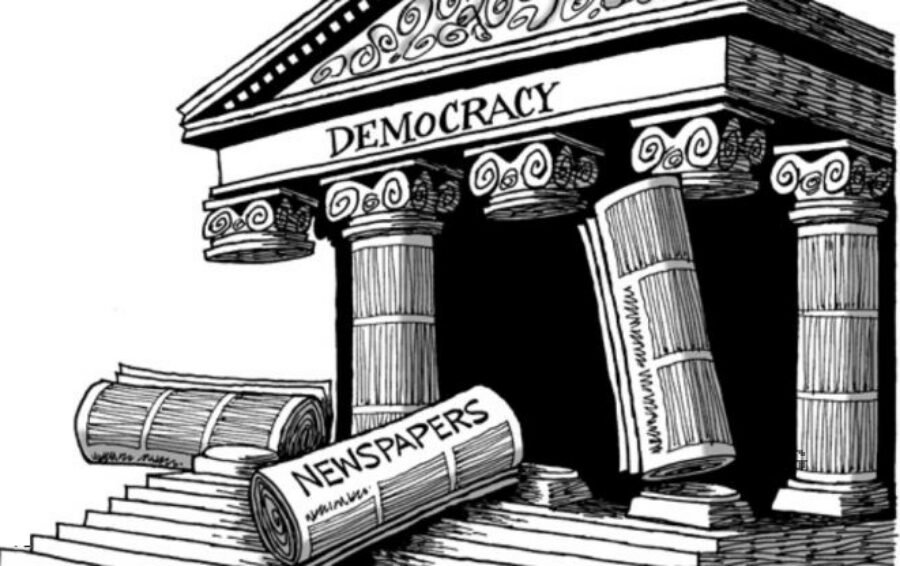The term Fourth Power refers to the media (media). It was originally reported in the press, as it was the only media, before the development of the rest (radio, television, Internet).
The title of the Fourth Power has been established on the basis of the three powers we know: legislative, executive and judicial.
So somewhere here the indiscernible boundaries begin. Of course depending on the approach, the usefulness, or the disadvantagemode of the Fourth power changes.

First approach
In the first and best approach, the media, after their liberation and independence from the state, contributed to its democratization:
- They act controllingly towards the state and monitor the exercise of the three powers, revealing any abuses and ensuring transparency, that is, they perform the role of "guardian".
- They provide information on public issues to more and more groups, thus enlarging the political nation. As its size increases, so does its power, that is, its democracy.
- They convey the voice of the people, unifying all the different opinions that come from society and are worth hearing through the common prism to which they converge. In other words, they transmit public unanimity as it emerges through social dialogue.
Thus they function as a communication channel between the rulers and the people but also between the diverse groups of the latter. The media empowers the people: on the one hand by exercising review in political power and controlling it thoroughly and on the other hand by conveying the popular pulse and representing public opinion in government. This shift of power from the state to the people through the media, gives the latter the title of the Fourth Estate. Fourth Estate, in the sense that they embody the "voice of the people in the corridors of power".
Second Approach
The other view opposes the first, and this is because thefaceShe and the representatives of the political economy of the media deny the functioning of the media as a Fourth Estate. They believe that the media have never managed to free themselves from the power structure and become fully independent, but neither have they become the voice of society.
- The media are not neutral as long as they are large companies or depend on companies, they are subject to some ownership regime and in fact many times oligopolistic, even monopolistic. This, by definition, makes them agents of private (mostly) interests and distorts the role of "watchdog" since it is part of what they are supposed to control. (eg General Electric, Toshiba and Fiat are some of the companies that have acquired SMEs)
- The media, their owners and the journalists who work for them are part of the establishment. We can not forget their political commitments, the power exercised by their leadership groups, the relationship they seek to have with the government and the legislation to which they are subject. All this limits independent journalism to the limits of what is permissible and possible as defined by a capitalist system.
- Censorship may no longer be carried out by the state but it is just as harsh. This time it comes from the free market system and is in the form of dependence on advertising, the high market costs of most SMEs, the constant growth of oligopolies. So not all voices are heard equal, but those that have the chapter.
These are some of the points that show that the mass media rather manipulate and produce reality than act as a mirror of it. Thus, there is probably no Fourth Estate, as a power of the people through the media as the first view claims, but rather the power of the media, according to the economic and cultural elite in power, over the people.
Mixed grill

What will happen now if we confuse the two approaches above?
For example, what would a hidden Fourth power that strengthens the state machine look like to you?
We are talking about an illusion of the first approach, where under the banner of justice, autonomy and the well-being of the People, governments can and do exist, simply because they do not convey information.
Why am I writing all of the above? So we are in 2022 and I think we are addressing an audience that can think and judge out of the boundaries, or at least outside the established limits.
Roasting TV channels and using a political (non-political) sauce (regardless of color) can create great dishes, but they are far from the truth. Let us not forget the value of the raw truth….






In the 80's we said an expression: What is happening now in the US, we will have it, we will face it in 20 years.
Decades passed, in general the media were of the media (media) until we reached the frustrating day of our "inclusion" in the deadly Memoranda where, among other things, the media speakers began to stare at the camera (and they seem to be absurd…) even if one is 40 cm away from his interlocutor.
The reason this was done (under the mandates and guidance of the, institutions, as he called them "I do not have a single badge and you made me prime minister") was, every speaker, commentator on an issue, to pierce, submit, direct and command the mind of the amoeba. The viewer who has IQ of radish, but also more. Maybe a lot of "smart".
This certainly did not happen by itself. At the same time, the great thinkers magically disappeared from society (because the media does not invite them to speak), the great lyricists, poets, writers disappeared. In other words, those who could act as an antidote to the stupidity imposed by the media through its anchormans were lost.
And now let's go to the main course. Did the media speakers do it themselves? Of course not. They did it on instructions, orders but also for a rough fee from the owners of the media.
And rightly so, some thoughts arise here: who are these owners, my child? Who owns the media?
Let's talk about Greece (ATTENTION! I love my homeland Greece, but I hate "Greece", the colony of lenders and the home of idiots) where, owner of an oil company, who is also a shipowner, has two TV stations.
Another TV station owner has a fuel fleet
Another shipowner is preparing to enter the television landscape (while it already has newspapers and a radio station) from the side (an Internet television station platform). (*)
I could quote such a lot. Especially if I was thinking of referring to the USA as well.
So, what kind of pluralism and what kind of credibility, neutrality are we talking about when ALL of them are government financiers?
For what unbound "4th power" can someone propose to me?
For what real information can someone tell me when ALL THESE (those of the 4th power) owe what we all owe to the Greek State after 100 generations?
I will not record more, I will not steal more time from any readers, I will not take advantage of iguru tolerance. But all I will ask of each one is TO FINALLY USE THAT "WEIGHT" OF ~ 1.200 grams that he has inside his skull, his mind and to filter what he hears, reads and is projected by the (media (mass media) .
And once he does, I guess he'll rank them where they need to be. To nowhere. It will devalue them.
s.GTHK: if I wrote in my blog I would put the names, but here I will not do it so as not to put in a difficult position people I appreciate. I declare that I have unlimited respect for Politics, for Information, for my Fellow Man, but not at all for the swindlers that the system of the feudal elitist dictatorship creates or promotes. Worldwide.